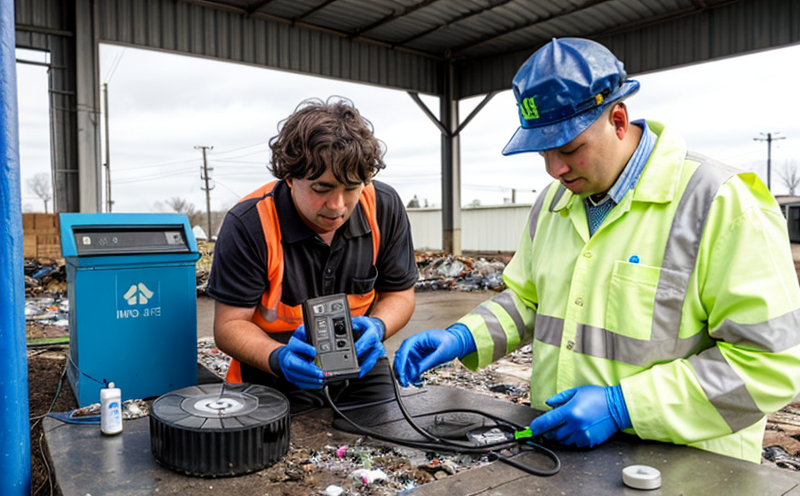DIN EN 16219 Thallium Content in Battery Waste
The DIN standard, DIN EN 16219 specifies the method for determining the thallium content in battery waste. This method is crucial for ensuring compliance with regulatory requirements and supporting sustainable practices within the electronics sector.
Battery waste contains various hazardous materials that can be harmful to human health and the environment if not managed properly. Thallium, being a highly toxic heavy metal, poses significant risks when released into the ecosystem through improper disposal or recycling processes. Accurate determination of thallium content is thus essential for effective environmental protection.
The test protocol outlined in DIN EN 16219 involves several key steps to ensure precision and reliability:
- Sample preparation: The battery waste sample must be thoroughly homogenized before analysis.
- Leaching: A chemical leachate process is used to extract thallium from the solid matrix of the battery waste.
- Detection: Instrumentation such as Inductively Coupled Plasma Mass Spectrometry (ICP-MS) or Flame Atomic Absorption Spectroscopy (FAAS) can be employed for precise measurement.
The standard specifies acceptance criteria ensuring that results are within acceptable limits set by environmental regulations. Understanding these parameters helps stakeholders comply with international standards like ISO 14001 and EU Waste Framework Directive.
Thallium content testing is a critical component in the broader scope of electronic waste management, which also includes mercury, cadmium, lead, and other hazardous substances. This service supports the responsible recycling and disposal practices necessary for minimizing environmental impact and ensuring worker safety.
Why Choose This Test
Selecting DIN EN 16219 thallium content testing offers several advantages:
- Regulatory Compliance: Ensures adherence to stringent environmental standards, enhancing your company's reputation and reducing legal risks.
- Risk Management: Identifies potential hazards early in the recycling process, protecting personnel and minimizing liabilities.
- Data Accuracy: High-precision methods provide reliable data for informed decision-making throughout the waste management lifecycle.
- Sustainability: Supports sustainable practices by contributing to reduced environmental footprints and better resource recovery.
By choosing this testing service, you demonstrate a commitment to safety and sustainability that resonates positively with stakeholders.
Customer Impact and Satisfaction
- Informed Decision-Making: Reliable data guides strategic waste management strategies, enhancing operational efficiency.
- Improved Reputation: Demonstrating adherence to international standards boosts customer confidence and trust.
- Enhanced Worker Safety: Early identification of hazardous materials minimizes occupational risks.
- Sustained Compliance: Regular testing ensures ongoing compliance with changing regulations, mitigating potential disruptions.
The accurate results from this test contribute significantly to the overall satisfaction and trust of our clients, ensuring their commitment to sustainability is met with precision and reliability.
Environmental and Sustainability Contributions
DIN EN 16219 thallium content testing plays a pivotal role in promoting environmental responsibility and fostering sustainable practices. The accurate identification of hazardous materials like thallium aids in the development of more efficient recycling processes, which are crucial for minimizing environmental impact.
By adhering to this standard, businesses contribute positively to waste reduction efforts by ensuring that electronic waste is managed responsibly. This approach not only aligns with global sustainability goals but also supports local and national initiatives aimed at reducing landfill usage and promoting circular economy principles.
The service contributes to broader environmental benefits such as:
- Reduction of toxic emissions from landfills.
- Enhanced recycling efficiency through precise data.
- Support for responsible sourcing practices that prioritize environmental considerations.
In essence, this testing service is a vital tool in the ongoing journey towards a more sustainable future.





